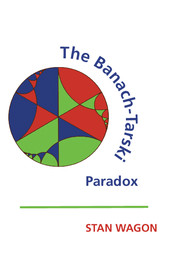Book contents
- Frontmatter
- Contents
- Foreword by Jan Mycielski
- Preface
- Preface to the Paperback Edition
- Part I Paradoxical Decompositions, or the Nonexistence of Finitely Additive Measures
- Chapter 1 Introduction
- Chapter 2 The Hausdorff Paradox
- Chapter 3 The Banach-Tarski Paradox: Duplicating Spheres and Balls
- Chapter 4 Locally Commutative Actions: Minimizing the Number of Pieces in a Paradoxical Decomposition
- Chapter 5 Higher Dimensions and Non-Euclidean Spaces
- Chapter 6 Free Groups of Large Rank: Getting a Continuum of Spheres from One
- Chapter 7 Paradoxes in Low Dimensions
- Chapter 8 The Semigroup of Equidecomposability Types
- Part II Finitely Additive Measures, or the Nonexistence of Paradoxical Decompositions
- Appendix A Euclidean Transformation Groups
- Appendix B Jordan Measure
- Appendix C Unsolved Problems
- Addendum to Second Printing
- References
- List of Symbols
- Index
Chapter 5 - Higher Dimensions and Non-Euclidean Spaces
from Part I - Paradoxical Decompositions, or the Nonexistence of Finitely Additive Measures
Published online by Cambridge University Press: 05 August 2012
- Frontmatter
- Contents
- Foreword by Jan Mycielski
- Preface
- Preface to the Paperback Edition
- Part I Paradoxical Decompositions, or the Nonexistence of Finitely Additive Measures
- Chapter 1 Introduction
- Chapter 2 The Hausdorff Paradox
- Chapter 3 The Banach-Tarski Paradox: Duplicating Spheres and Balls
- Chapter 4 Locally Commutative Actions: Minimizing the Number of Pieces in a Paradoxical Decomposition
- Chapter 5 Higher Dimensions and Non-Euclidean Spaces
- Chapter 6 Free Groups of Large Rank: Getting a Continuum of Spheres from One
- Chapter 7 Paradoxes in Low Dimensions
- Chapter 8 The Semigroup of Equidecomposability Types
- Part II Finitely Additive Measures, or the Nonexistence of Paradoxical Decompositions
- Appendix A Euclidean Transformation Groups
- Appendix B Jordan Measure
- Appendix C Unsolved Problems
- Addendum to Second Printing
- References
- List of Symbols
- Index
Summary
Since paradoxical decompositions depend on free groups, and since the group of rotations of S2 is contained in higher-dimensional rotation groups, it comes as no surprise that paradoxical decompositions exist for higher-dimensional spaces. This generalization is not completely obvious, though, since the fixed point set of an isometry does expand when the isometry is extended to a higher dimension by fixing additional coordinates. Nevertheless, the basic results from Chapter 3 on the existence of paradoxical decompositions do extend without requiring any new techniques (see Theorem 5.1). For example, we have already seen that the unit ball in Rn is Gn-negligible if n ≥ 3 (see proof of 2.6), and by the theorem of Tarski alluded to just prior to Theorem 2.6, it follows that such balls are paradoxical. But it is useful to see how the decompositions in higher dimensions may be obtained quite directly from the construction on S2, as is done in Theorem 5.1.
The expansion of the fixed point set is a crucial impasse to generalizing the finer analysis of Chapter 4, however. This is because new fixed points completely destroy the local commutativity of a group when it is viewed as acting on a higher-dimensional space. Nonetheless, locally commutative free groups of isometries (and, where possible, free groups without fixed points) do exist; hence there are minimal paradoxical decompositions in all higher dimensions (see 5.5).
Information
- Type
- Chapter
- Information
- The Banach-Tarski Paradox , pp. 52 - 72Publisher: Cambridge University PressPrint publication year: 1985
